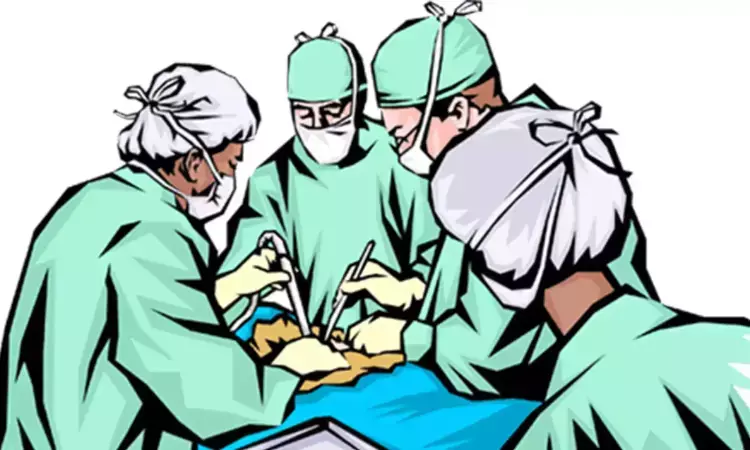- Home
- Medical news & Guidelines
- Anesthesiology
- Cardiology and CTVS
- Critical Care
- Dentistry
- Dermatology
- Diabetes and Endocrinology
- ENT
- Gastroenterology
- Medicine
- Nephrology
- Neurology
- Obstretics-Gynaecology
- Oncology
- Ophthalmology
- Orthopaedics
- Pediatrics-Neonatology
- Psychiatry
- Pulmonology
- Radiology
- Surgery
- Urology
- Laboratory Medicine
- Diet
- Nursing
- Paramedical
- Physiotherapy
- Health news
- Fact Check
- Bone Health Fact Check
- Brain Health Fact Check
- Cancer Related Fact Check
- Child Care Fact Check
- Dental and oral health fact check
- Diabetes and metabolic health fact check
- Diet and Nutrition Fact Check
- Eye and ENT Care Fact Check
- Fitness fact check
- Gut health fact check
- Heart health fact check
- Kidney health fact check
- Medical education fact check
- Men's health fact check
- Respiratory fact check
- Skin and hair care fact check
- Vaccine and Immunization fact check
- Women's health fact check
- AYUSH
- State News
- Andaman and Nicobar Islands
- Andhra Pradesh
- Arunachal Pradesh
- Assam
- Bihar
- Chandigarh
- Chattisgarh
- Dadra and Nagar Haveli
- Daman and Diu
- Delhi
- Goa
- Gujarat
- Haryana
- Himachal Pradesh
- Jammu & Kashmir
- Jharkhand
- Karnataka
- Kerala
- Ladakh
- Lakshadweep
- Madhya Pradesh
- Maharashtra
- Manipur
- Meghalaya
- Mizoram
- Nagaland
- Odisha
- Puducherry
- Punjab
- Rajasthan
- Sikkim
- Tamil Nadu
- Telangana
- Tripura
- Uttar Pradesh
- Uttrakhand
- West Bengal
- Medical Education
- Industry
Peripheral nerve stimulation may reduce pain and opioid need after orthopedic surgery: Study

USA: Postoperative percutaneous peripheral nerve stimulation (PPNS) after ambulatory orthopedic surgery reduced pain and opioid requirements without side effects during at least the initial week, a recent study has found. The findings of the study are published in the journal Anesthesiology.
PPNS is an analgesic technique in which a lead is implanted percutaneously followed by the delivery of electric current using an external pulse generator. It has been used extensively for chronic pain, but for acute postoperative pain, only uncontrolled series have been published. Brian M. Ilfeld and colleagues undertook this multicenter study to (1) determine the feasibility and optimize the protocol for a subsequent clinical trial and (2) estimate the treatment effect of percutaneous peripheral nerve stimulation on postoperative pain and opioid consumption.
For this purpose, the researchers percutaneously implanted an electrical lead preoperatively to target the sciatic nerve for major foot/ankle surgery (e.g., hallux valgus correction), the femoral nerve for anterior cruciate ligament reconstruction, or the brachial plexus for rotator cuff repair, followed by a single injection of long-acting local anesthetic along the same nerve/plexus. Postoperatively, participants were randomized to receive either electrical stimulation (n = 32) or sham stimulation (n = 34) using an external pulse generator in a double-masked fashion for 14 days.
The dual primary treatment effect outcome measures were (1) cumulative opioid consumption (in oral morphine equivalents) and (2) mean values of the "average" daily pain scores measured on the 0 to 10 Numeric Rating Scale within the first 7 postoperative days.
Key findings of the study include:
- During the first 7 postoperative days, opioid consumption in participants given active stimulation was a median of 5 mg versus 48 mg in patients given sham treatment (ratio of geometric means, 0.20.
- During this same period, the average pain intensity in patients given active stimulation was a mean ± SD of 1.1 ± 1.1 versus 3.1 ± 1.7 in those given sham.
"Percutaneous peripheral nerve stimulation reduced pain scores and opioid requirements free of systemic side effects during at least the initial week after ambulatory orthopedic surgery," wrote the authors.
Reference:
The study titled, "Percutaneous Peripheral Nerve Stimulation (Neuromodulation) for Postoperative Pain: A Randomized, Sham-controlled Pilot Study," is published in the journal Anesthesiology.
DOI: https://pubs.asahq.org/anesthesiology/article/doi/10.1097/ALN.0000000000003776
Dr Kamal Kant Kohli-MBBS, DTCD- a chest specialist with more than 30 years of practice and a flair for writing clinical articles, Dr Kamal Kant Kohli joined Medical Dialogues as a Chief Editor of Medical News. Besides writing articles, as an editor, he proofreads and verifies all the medical content published on Medical Dialogues including those coming from journals, studies,medical conferences,guidelines etc. Email: drkohli@medicaldialogues.in. Contact no. 011-43720751


